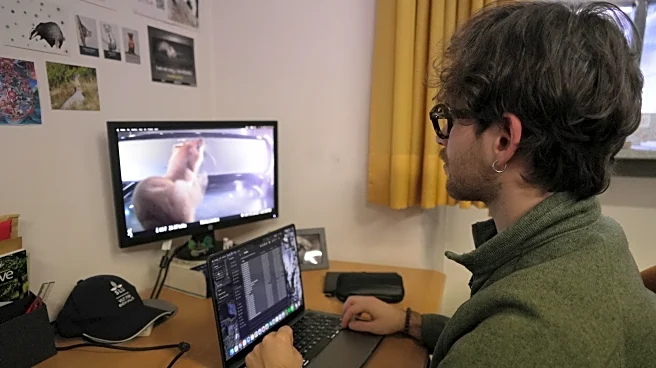What's Happening?
The European Society for Medical Oncology (ESMO) 2025 Congress showcased significant advancements in cancer research, with over 35,000 attendees and nearly 3,000 abstracts presented. Key developments included
the maturation of antibody-drug conjugates (ADCs), targeting previously undruggable cancer mutations, and the use of circulating tumor DNA (ctDNA) assays for real-time therapeutic monitoring. Notable studies highlighted the efficacy of trastuzumab deruxtecan (T-DXd) in HER2-positive breast cancer, datopotamab deruxtecan in metastatic triple-negative breast cancer, and sacituzumab tirumotecan in non-small cell lung cancer. Additionally, the congress emphasized the growing role of Asia in global oncology innovation and the need for strategic planning in clinical trial design.
Why It's Important?
The advancements presented at ESMO 2025 have the potential to significantly impact cancer treatment protocols and patient outcomes. The shift towards earlier intervention and personalized care could improve survival rates and quality of life for cancer patients. The focus on previously undruggable targets like KRAS mutations opens new avenues for precision oncology, potentially leading to more effective treatments for resistant cancers. The use of ctDNA assays for therapeutic monitoring could refine treatment decisions, reducing overtreatment and improving patient management. These developments underscore the importance of global collaboration and strategic planning in oncology research and development.
What's Next?
Future steps include further evaluation of ADCs to establish new standards of care, particularly in earlier-stage cancers. Continued research into KRAS inhibitors and ctDNA assays will likely refine therapeutic strategies and improve precision in cancer treatment. The growing role of Asia in oncology innovation suggests increased collaboration and harmonization of global research efforts. Stakeholders will need to address regional differences in genetics and healthcare infrastructure to ensure the applicability of research outcomes across diverse populations. The oncology community is poised to translate these insights into clinical practice, optimizing trial design and regulatory frameworks to prioritize patient outcomes.
Beyond the Headlines
The ESMO 2025 Congress highlights a paradigm shift in oncology, emphasizing the convergence of science, strategy, and patient-centric thinking. The rapid pace of change demands renewal in clinical practice and trial design, with a focus on molecular precision and global perspectives. Ethical considerations in trial design and resource allocation are crucial as the field evolves. The emphasis on earlier intervention and personalized care reflects a broader cultural shift towards patient empowerment and informed decision-making in healthcare.











